A dry cough is a type of cough that doesn’t produce any sputum or phlegm. It feels as if something’s stuck in your throat and you cannot get it out even with continuous coughing. Try the much you can, the choking sensation remains. It occurs when the back of your throat (or pharynx) becomes irritated or inflamed.
Causes Of Dry Cough
Dry cough is most often the result of infection by cold and flu viruses, irritation of the throat by some air pollutants (like cigarette smoke, dust, acid reflux, etc.) or allergies (like hayfever).
Home Remedies
- Honey
Ever noticed that honey is a common component of most cough syrup? That’s because of its potency in treating cough of all kinds. Think of using honey in its pure and raw form for the same reason. It works because of its analgesic properties that eliminate the mucus and soothe your throat. Honey is effective also because it has strong anti-oxidant and anti-microbial properties, both effective for relieving sore throat. The ideal way to take honey is by mixing it with warm milk. This will also go a long way in relieving you from any chest pain you may have due to incessant coughing.
- Salty Water
Salty water is different from salt water. In fact, the later means sea water which has no proven record of cure for cough. Salty water helps treat sore throat through osmosis. It can be a good remedy for a dry cough as well. The therapy works because the salt inside the cells of the mucous membranes flows out to balance the salt outside of the cells, and this will reduce swelling. To use this, mix one teaspoon of salt in 8 ounces (240ml) of warm water. Take a sip, gargle for 15 seconds and spit out. Take another sip and repeat the process. Be sure to rinse your mouth with plain water afterwards. Be careful in using this with children (should be 2 years and above); they may swallow the water instead of gargling. There is no danger in swallowing salty water but that does not serve a cure for dry cough.
- Turmeric
The turmeric contains an active agent that has strong anti- viral, anti-bacterial and anti-inflammatory properties. This agent is called curcumin. Turmeric is therefore quite effective in treating viral infections like cough and cold. To try this remedy, take a teaspoon of fine turmeric powder and mix it with equal amount of carom seeds. Now add them to about 1 litre of boiling water and let it boil until only half of it remains. Add a little honey to this solution and take it thrice a day with a shot glass (about 43ml). You can also mix the turmeric with warm milk and drink to experience relief from dry cough.
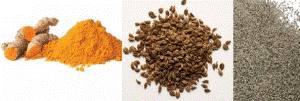

- Ginger
Ginger is another prominent constituent of cough syrups, especially because it is a natural analgesic. It helps soothe irritation and scratchiness caused by sore throat. It also has anti-inflammatory properties and leaves a cleansing effect on your respiratory system. In the comfort of your home, cut a ginger into small pieces and crush them completely. Add it to water and start boiling. Once cooled off, you should take it at least thrice a day for dry cough relief. What is more, you can rub ginger oil on your chest or even chew ginger slices to treat dry cough.
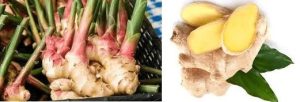
- Steam
Steam loosens phlegm and mucous and helps lessen the scourge of dry cough. You can add specific essential oils and take advantage of their anti-bacterial, anti-viral, and anti- inflammatory properties. All you need for this home remedy are: a bowl of water, a clean towel, a couple of drops of eucalyptus oil and 3 drops of tea-tree oil. Boil the water in a heatproof bowl and add the essential oils to it. Now lean over the bowl and inhale the steam for 5 to 10 minutes thrice a day. Keep your head covered with the clean towel for better exposure of your face to the steam. The heat may be disturbing but, that’s really what you need.

- Garlic
Because of the active agent in garlic called “allicin” (responsible for the aroma in fresh garlic), it can be one of the most effective home remedies for dry cough. Garlic has anti-microbial, anti-bacterial and anti-viral properties. It also boosts your immune system and helps you fight the infections that cause dry cough. Just boil a glass of water and add a few garlic cloves to it. While it’s boiling, add a teaspoon of oregano to the mixture. Once cooled, filter off the liquid, add some honey and drink the mixture twice a day. Mixing up garlic with oregano and honey will also help relieve soreness. A special type of oregano that belongs to perennial herb and is known as marjoram can be used alone to handle dry cough. Boil some oregano in a cup of water. Filter it and drink it regularly with shot glass to help improve your condition.
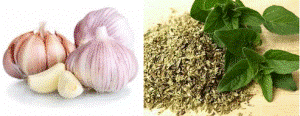
- Marshmallow Leaves
Owing to its pain and inflammation relieving properties, marshmallow leaves have been used extensively as an effective home remedy for dry cough. They also protect the mucous membrane tissue and save it from further damage. How do you go about it? It takes little. Steep about 3 grams of dried marshmallow leaves in a cup of hot water for 10 to 12 minutes. Now strain out the herb and drink the solution for relief. By the time you drink three cups of marshmallow tea (morning, afternoon and night), you will find relief from the dry cough. It is preferable to take it while it is still hot.
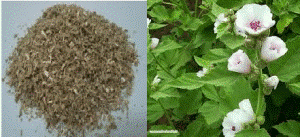
- Basil Concoction
Basil, better known to most Indians as Tulsi , is regarded as the most sacred plant in any herbalist’s collection. There are religious uses of this herb but the potency of the herb is evidently innate. It goes beyond the ritual and incantations that follow. Tulsi is therefore a handy ingredient in most Ayurvedic cough syrups, cough suppressants and expectorants. Locate it somewhere in your kitchen or find it in the nearest bush. If you do not have the time to boil it in water, simply chew some fresh basil leaves for quick relief. Otherwise, add a handful of basil leaves to boiling water and steep for 15 minutes. Inhaling the steam from a few drops of basil essential oil in boiling water could also suffice.
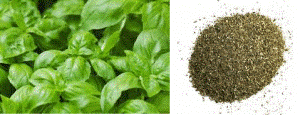
- Eucalyptus Oil
Also refered to as ‘Nilgiri taila’ in India, eucalyptus occupies an important position in Ayurvedic medicine. The oil of eucalyptus is very effective as a decongestant that also promotes vitality. In addition to providing symptomatic relief, eucalyptus oil could also help treat the infection, depending on the underlying cause of the dry cough. Besides the usual salty-water gargle, you can add a pinch of salt and 2 drops of eucalyptus oil to a glass of warm water and gargle. Additionally, apply a few drops of eucalyptus oil to your palms and gently massage your throat and upper chest. Alternatively, you can add 2 to 3 drops of eucalyptus oil to a bowl of boiling water and inhale the vapor as you cover your head with a clean towel.
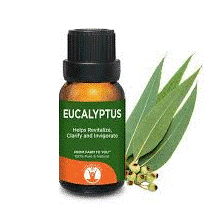
Bignedu
Note: Though the above is verifiable, it is only a general information and is neither a professional medical advice, diagnosis, treatment or care nor is it a substitute thereof. The piece does not cover all conditions or remedies associated with the illness. In extraordinary cases, make effort to consult with your physician or other qualified health personnel as necessary. Please see our Terms & Conditions at the footer area.








